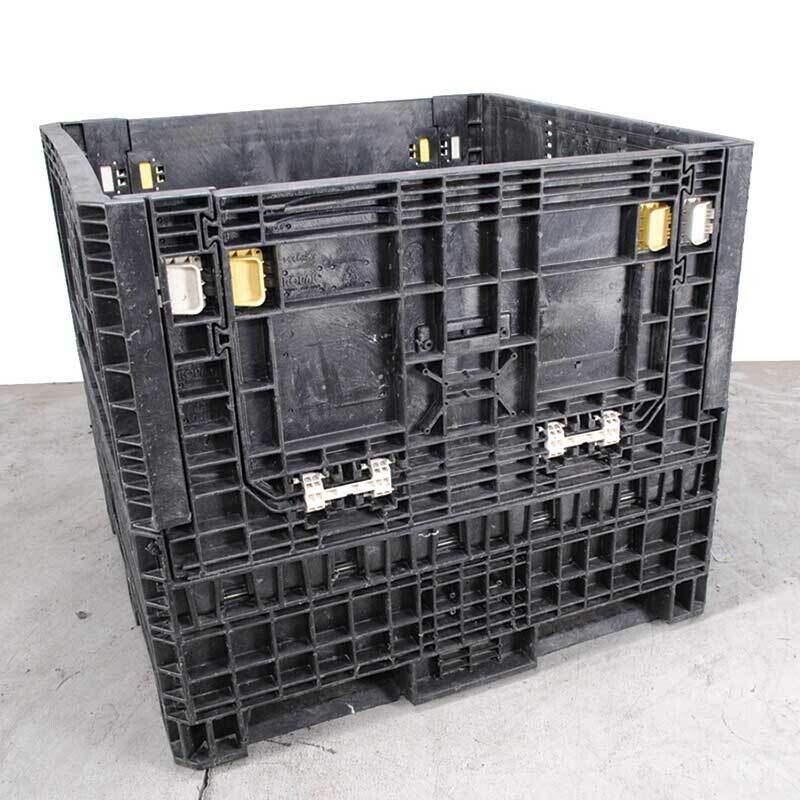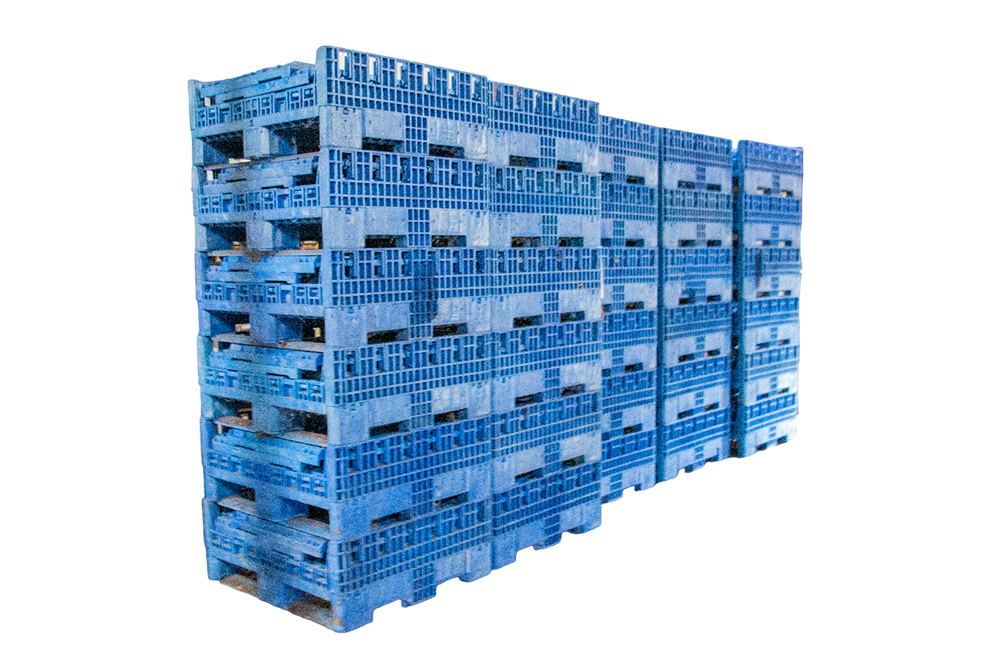Why refurbished bulk containers and used collapsible bulk containers are sustainable assets
Wiki Article
The Ultimate Overview to Selecting the Right Bulk Containers for Your Company Requirements
Selecting the suitable mass containers is vital for any kind of company that relies upon efficient logistics. Various kinds of containers exist, each made for details materials and applications. Aspects such as dimension, product compatibility, and governing requirements play a substantial duty in this decision-making process. Recognizing these elements can result in enhanced functional performance. Several organizations overlook necessary facets that could improve their total efficiency and sustainability. What are these factors to consider?Understanding Different Kinds Of Mass Containers
Bulk containers act as crucial tools for organizations seeking efficient storage and transport services. These containers are available in different types, each designed to satisfy certain functional needs. One usual type is the intermediate bulk container (IBC), which is optimal for liquid and granulated materials, providing a balance of ability and ability to move. One more prominent option is the bulk bag, or FIBC, suitable for completely dry, flowable items. These flexible containers are lightweight and can be conveniently transported and kept. For much heavier materials, inflexible bulk containers are usually used, supplying sturdiness and stability for risk-free handling. Furthermore, there are specialized containers customized for dangerous materials, making sure conformity with security regulations. Recognizing the distinctive attributes of these mass container types allows services to make informed decisions that maximize logistics and reduce expenses. By selecting the appropriate container, business can improve their operational efficiency and streamline their supply chain procedures.Secret Material Considerations for Mass Containers
When choosing bulk containers, it is necessary to consider the materials used in their construction. Aspects such as chemical, durability, and toughness compatibility play a crucial role in making sure the containers satisfy details operational needs. Additionally, weight and mobility concerns can influence both efficiency and transportation logistics.Product Resilience and Strength
Durability and strength are critical consider picking materials for bulk containers, as they straight influence the container's capacity to withstand numerous environmental problems and handling processes. Products such as high-density polyethylene (HDPE), polypropylene, and stainless-steel are typically preferred for their robust residential properties, using resistance to abrasion, temperature, and effect changes. The selection of product likewise affects the general lifespan of the container; more powerful products commonly cause much less constant substitutes, leading to set you back savings with time. Additionally, the weight of the product can impact shipping expenses and ease of handling. Companies must consider their particular functional settings and the possibility for deterioration to guarantee peak sturdiness and strength in their mass container choice.Chemical Compatibility Aspects
Recognizing chemical compatibility is vital for choosing mass containers, as the products made use of must withstand the specific substances they will hold. Different factors influence compatibility, including the chemical nature of the materials, temperature level, and period of storage. As an example, corrosive chemicals may require containers made from stainless-steel or specialized plastics that resist degradation. Additionally, responsive compounds can create warm or gases, requiring aired vent or pressure-rated containers. The selection of container material, whether metal, polyethylene, or polycarbonate, ought to align with the chemical homes of the kept materials to avoid leakages or violations. Ultimately, a thorough examination of these compatibility elements guarantees secure handling and storage space, protecting both employees and the atmosphere while maintaining product stability.Weight and Mobility Issues
Picking bulk containers entails not only examining chemical compatibility but likewise considering weight and transportability. Businesses have to evaluate the convenience of handling and transport to optimize efficiency. Lightweight products like high-density polyethylene (HDPE) or light weight aluminum can promote easier activity and lower delivery costs. Conversely, heavier containers might supply boosted toughness yet can impede mobility, particularly in atmospheres requiring constant relocation. In addition, the style of the container ought to permit for practical lifting and piling, making sure ergonomic security for workers. Companies ought to also consider the framework available for transport; as an example, containers compatible with forklifts or pallet jacks can streamline procedures. Inevitably, the ideal equilibrium between weight and transportability straight affects functional efficiency and expense performance.Sizing Your Mass Containers for Optimal Effectiveness
When sizing bulk containers, services must meticulously analyze the measurements needed to accommodate their specific products. In addition, weight ability is an essential aspect that influences effectiveness and security during transportation and storage space. Efficient sizing not only takes full advantage of area however likewise optimizes operational workflows.Determining Container Capacities
Choosing the ideal dimensions for bulk containers is important for making the most of performance in storage space and transportation. Companies have to assess their details needs, thinking about aspects such as offered area, the nature of the products being kept, and the approaches of transportation made use of. Exact measurements guarantee that containers fit preferably in storehouses and automobiles, decreasing lost room and minimizing handling time. Criterion sizes can offer convenience, but custom measurements might be essential for unique needs or to suit specific items. Additionally, it is essential to examine stacking abilities and ease of access, as these variables affect total functional performance. Inevitably, the appropriate dimensions result in boosted company and streamlined logistics, profiting the general performance of the service.Weight Capacity Considerations
Understanding weight capability is crucial for businesses aiming to optimize their mass container effectiveness. The weight capability of a container straight influences storage space abilities, transport logistics, and overall functional costs. Picking containers with the proper weight limitations assures that companies can safely save and transport their goods without running the risk of damages or conformity concerns. Overloading containers can lead to architectural failings, while underutilizing capacity lead to lost resources. When picking containers, it is important for businesses to analyze their item weights and consider any regulative demands. Furthermore, factors such as the kind of product, meant use, and environmental problems ought to likewise affect weight capacity choices. By evaluating these aspects, organizations can enhance efficiency and assure a streamlined supply chain.Regulatory Conformity and Safety Requirements

Regulative conformity and safety and security standards play a vital duty in the selection of mass containers for organizations. Organizations should guarantee that resource their containers fulfill various regulations established by local, national, and global authorities. These requirements often refer to material safety and security, architectural honesty, and correct labeling, which help avoid accidents and ensure the secure transport of items.
In addition, adherence to industry-specific guidelines, such as those from the Fda (FDA) or the Occupational Safety And Security and Wellness Management (OSHA), is essential for business handling unsafe products or foodstuff. Non-compliance can lead to penalties, lawful issues, or damage to an organization's track record.
Services need to additionally take into consideration the container's compatibility with the products being stored or transported to prevent contamination or chemical reactions (used bulk containers). To summarize, recognizing and implementing regulative compliance and safety requirements is crucial for the reliable and liable usage of bulk containers
Sustainability Options for Eco-Friendly Bulk Containers

Companies are also discovering choices made from recycled materials, which not just save sources however likewise sustain the reusing market. Developments in style permit for lighter containers that require much less energy to transport, additionally enhancing sustainability. By incorporating these green bulk container options, businesses can demonstrate their dedication to ecological stewardship while meeting customer need for lasting methods. This shift not just helps the world but can likewise improve brand name reputation and customer loyalty.
Cost-Effectiveness and Budgeting for Bulk Containers
While several organizations concentrate on sustainability, cost-effectiveness continues to be a crucial variable when selecting mass containers. Organizations has to assess the first acquisition price, in addition to long-lasting click here for info operational prices, to assure financial viability. Factors such as reusability, upkeep, and toughness play a substantial duty in determining overall expenses.Investing in high-quality containers may yield higher in advance costs however can cause savings with reduced replacement rates and reduced waste. In addition, companies need to consider transport expenses and storage space effectiveness, as these can impact the general budget plan.

Regularly Asked Questions
How Do I Establish the Right Container for Hazardous Materials?
To determine the ideal container for harmful materials, one need to assess compatibility with the compound, take into consideration the container's product, check for regulatory compliance, and evaluate capability and safety features to ensure appropriate handling and storage space.Can Mass Containers Be Customized for Particular Products?
Yes, bulk containers can be customized for particular items. used plastic containers. Numerous features, such as material, design, and dimension, can be customized to fulfill distinct requirements, ensuring optimal safety and effectiveness for transferring and storing various itemsWhat Is the Ordinary Life-span of Various Mass Container Kind?
The ordinary lifespan of bulk container types varies; plastic containers last 5-10 years, metal containers 10-20 years, and wood containers usually last 3-7 years, depending on use, upkeep, and environmental problems.Just how Should I Clean and Maintain Bulk Containers?
To clean up and keep bulk containers, one must on a regular basis evaluate for damage, remove deposit, wash with appropriate detergents, wash extensively, and assurance correct great post to read drying out before storage. Complying with supplier standards enhances durability and security during usage.Exist Rental Choices for Bulk Containers Available?
Yes, countless business supply rental choices for bulk containers, supplying versatility for organizations. These leasings can suit various demands, permitting firms to handle stock effectively without the dedication of purchasing containers outright.Longevity and stamina are important factors in choosing materials for bulk containers, as they straight influence the container's ability to withstand various ecological conditions and handling processes. Understanding chemical compatibility is essential for selecting bulk containers, as the products made use of have to resist the details materials they will certainly hold. Comprehending weight capability is important for organizations intending to maximize their mass container effectiveness. Regulatory compliance and safety requirements play a vital function in the option of bulk containers for businesses. While numerous organizations concentrate on sustainability, cost-effectiveness continues to be a crucial factor when choosing mass containers.
Report this wiki page